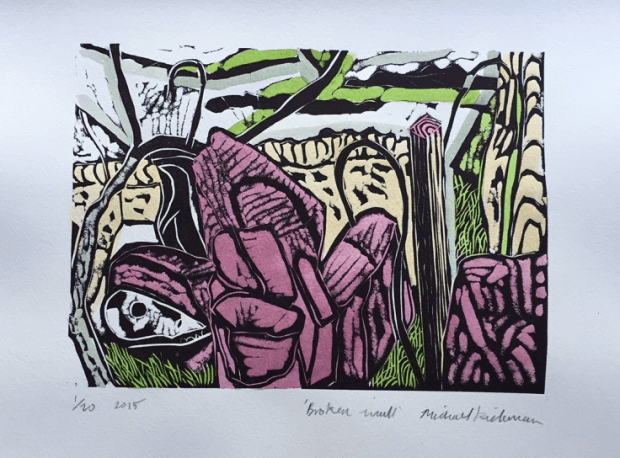At some point during your reading of this book the realisation might dawn, if you didn’t already know about his creative double life, that Richard Skelton demonstrates an unusual sensitivity to sound. Barbed wire unfolds over a dry-stone wall, an image which he reimagines as a mutant stringed instrument. ‘What harmonies would result if all were sounded in unison?’, Skelton asks — a question which he is uniquely placed to answer. Beyond the Fell Wall is a graceful meditation upon the relationship between landscape, language and sound, written by the most strikingly original composer of electronic music currently working in the UK — a man who spends his days exploring and gathering in the sounds of the fell land that borders his Cumbrian home.
The tools of his trade include digital recording devices and stringed musical instruments; Skelton improvises inchoate melodies by zoning inside the changeable moods of the environment, recordings captured in the field which become source material for his visionary, shape-shifting electronic soundscapes. Ordinarily, he releases his music via his own Corbel Stone Press in editions invariably accompanied by chapbooks of poetry and fragments of text. Beyond the Fell Wall is his first taste of distribution by a commercial publisher, and appears as interest in the work of nature writers like Richard Jefferies, Robert Mabey and Robert Macfarlane is in the ascendant.
Language and landscape — and the conservation of both — provided the subject of Macfarlane’s 2015 Landmarks, a volume not immune to wistfully phrased bucolic nostalgia. Skelton’s fell wall is situated near the River Duddon in Cumbria, once William Wordsworth’s muse. But he is no Romantic. Inner-city Hackney has nothing on this riot of wanton death, destruction and decay. Nature is an aggressor that imposes its arbitrary life-cycle on anyone (and any thing) that gets in its way. Urban destruction has the common decency to crumble around the whims of the market; but rural decay operates by the code of a secretive rulebook which, of course, nobody has read.
Skelton is, in fact, so over Romanticism that he feels able to reclaim one of its base concepts. The original meaning of the word ‘sublime’ — as understood, for instance, by J.M.W. Turner — was a physical beauty so overwhelming as to induce sensations of terror and inadequacy; and anyone foolhardy enough to attempt to conjure up appropriate vocabulary to rationalise this immeasurable force was invariably doomed to failure.
Which becomes Skelton’s starting point. ‘To put down words/ about this landscape/ as if they were stones… the act cannot accomplish/ much beyond mere ornament,’ he states in the first of several aphoristic poems that are interwoven through the main body-text. He resurrects the old Anglo-Saxon word ‘dustsceawung’ as he picks through the bones of a ruined farmhouse — a doleful experience which foretells, he asserts, his own eventual earthly absence.
Composers of electronica are prone to obsess over mortality. Tape and digital recording preserves sound, allowing composers to play God by breathing fresh life through its veins. Beyond the fell wall is the ‘waste’ — a no-man’s-land where sheep go to die, separated from the fertile field. Death is everywhere. That ruined farmhouse becomes a corpse: like the eyes, the roof is the first thing to decompose. Embedded inside his musical structures are out-of-body experiences, as microscopic details of dust and earth are viewed suddenly from the heavens as the perspective abruptly and dramatically shifts.
His book concludes with an equivalent narrative turnaround. In this desolate landscape cold, frost and ice represent an ultimate terror, conditions under which life cannot thrive. But in his epilogue Skelton rewinds back to the Ice Age then marches through history towards the arrival of man. The life-cycle is rebooted.





Comments